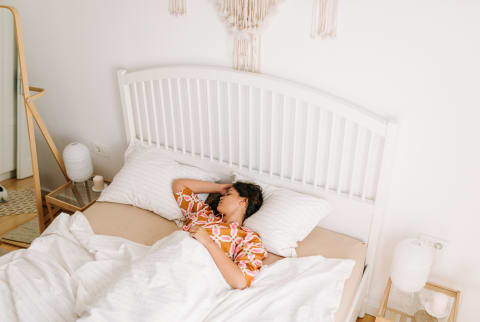How To Get Better Sleep Tonight, Based On Your Enneagram Type


Figuring out your Enneagram personality type can offer insight into the inner workings of you. The nine types each have their own way of dealing with stress, finding love, the list goes on. So, in the name of better sleep, we asked Steph Barron Hall, author of The Enneagram in Love, for her take on how each type can nail bedtime and assigned an Enneagram-approved tip from there.
Type One: Ditch the news before bed.
"Ones tend to want to fix things," Hall tells mbg. So, seeing upsetting current events will make them want to fix it or do something about it. And if they can't, they'll feel frustrated, which can prevent good sleep. Ones should aim to get their daily dose of news during the day and, when it's time for bed, opt for something a little lighter or even humorous.
Type Two: Give yourself a moment of stillness.
Twos tend to consider the well-being of others before their own, Hall notes. "It can be tempting for twos to put their sleep hygiene on the back burner. But instead of making everyone else comfortable, it helps when twos can take a few minutes to themselves to feel centered and calm." For this, Hall recommends a pre-bed meditation. It doesn't have to be anything lengthy, and if you're new to meditating, she suggests trying some guided or app-based meditations.
Type Three: Put the phone down.
For threes, the biggest issue may very well be putting the phone down at the end of the night. "Threes always want to have their phone within arm's reach," Hall says, "but unless they have a job where they absolutely need to be on call, everything will be OK if the phone isn't right there." So for them, getting a separate alarm clock and leaving the phone out of the bedroom will help them wind down faster.
Type Four: Set the tone.
Fours want to get calm and cozy, but they tend to dislike routine. For that reason, Hall says they would be well served to curate a bedtime routine they can enjoy, whether that's through calming scents, lighting, or music. Whatever creates an "immersive, sensory experience" to help them calm down is great for these folks.
Type Five: Try something evidence-based.
Fives trust evidence and science-backed tools, be it a sleep supplement that has ingredients with research to back it up, a time-restricted eating window, or blue-light-blocking glasses.* They can also go off the evidence they've collected in their own lives—i.e., I sleep better if I don't eat too close to bedtime. They need to get clear on their own sleep hygiene patterns, recognize what's worked best for them in the past, and make a strategy they can trust from there.
Type Six: Create structure in the evening and at bedtime.
"Sixes can get really anxious," Hall says, "and if they let their mind wander at night, [they can get] stuck on what could happen." To help with some of those nightly nerves, she says a solid routine to split up both your workday and evening, as well as evening and bedtime, will help you "put your worries on the shelf," so by the time bedtime rolls around, your mind will have already begun unwinding from the day.
Type Seven: Give yourself lots of wind-down time.
"Sevens often think they can switch from on to off to on again just like that. But it's just not the most supportive for getting good sleep," Hall explains. They "tend to go a million miles a minute." So she suggests giving ample time to calm down with a slower bedtime routine, at least an hour before bed: "Turn down the lights, read a book, do something relaxing, to let their mind know we're moving toward sleep," she says.
Type Eight: Burn off steam with exercise.
For eights, like ones, Hall recommends avoiding watching the news before bed but for a different reason; "Whenever eights see injustice, it lights a fire in them. They get really passionate and angry, which is an amazing tool during waking hours," she says, "but most of us just don't sleep well when we're that angry." She recommends, in this case, exercising to blow off some of that steam. She adds it would even be a good idea for eights to work out directly after watching the news earlier in the day.
Type Nine: Go back to basics.
And lastly, Hall notes that a lot of nines have a pretty easy time with sleep because "it's their go-to state when they feel a bit overwhelmed." But they can still have restless nights like anyone else, so it's important for them to pay attention to their own needs. "Like twos," she says, "they can focus so much on the needs of others that they forget what's important for their own well-being."
Focusing on the essentials like daily exercise, or even a breathing exercise before bed, will help nines feel more calm and attentive to what they need so they can sleep well.

Sarah Regan is a Spirituality & Relationships Editor, a registered yoga instructor, and an avid astrologer and tarot reader. She received her bachelor's in broadcasting and mass communication from State University of New York at Oswego, and lives in Buffalo, New York.

